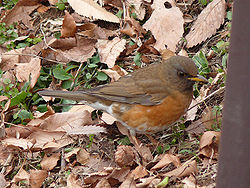| Brown-headed thrush | |
|---|---|
 | |
| Scientific classification | |
| Kingdom: | Animalia |
| Phylum: | Chordata |
| Class: | Aves |
| Order: | Passeriformes |
| Family: | Turdidae |
| Genus: | Turdus |
| Species: | T. chrysolaus |
| Binomial name | |
| Turdus chrysolaus Temminck, 1832 | |
The brown-headed thrush (Turdus chrysolaus), sometimes known as the brown thrush, [2] is a species of bird in the family Turdidae. It breeds in Sakhalin, the Kuril Islands and Japan; it winters in south toward the Ryukyu Islands, Taiwan, Hainan and the northern Philippines. Its natural habitat is temperate forests.
